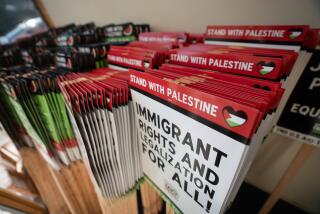Islamic Nations Hint They Might Send Bosnia Arms
- Share via
JIDDA, Saudi Arabia — The world’s Islamic community, seeking to force a showdown on aid to the besieged Muslims of Bosnia-Herzegovina, early today demanded immediate military intervention by peacekeeping forces in the former Yugoslav republic and an end to the international arms embargo against it.
Muslim foreign ministers meeting here held out the possibility that Muslim nations will ignore the weapons ban if the United Nations does not act by Jan. 15. They sought to avert an international religious confrontation over the sectarian conflict in tiny Bosnia, emphasizing the need for concerted international action through the United Nations.
But they also hinted that the Islamic world will not remain passive if the global community fails to move decisively to stop the bloodshed in Bosnia, where thousands of people, many of them Muslims, already have died.
“This tragedy has deepened the sense of solidarity of the Muslim world. We have long awaited this day,” Bosnian President Alija Izetbegovic told the session of the Organization of the Islamic Conference.
Osden Sanberk, Turkey’s foreign undersecretary, added: “We are not warmongers but there is a real problem there, and the problem must be addressed.”
Dropping a relatively milder resolution late in the evening when Bosnian officials pleaded for a stronger course, the conference set a Jan. 15 deadline for U.N. action. It left open a path, thereafter, for “further measures” to be taken by Islamic nations “with a view to responding positively to requests of the Republic of Bosnia-Herzegovina” for defensive weapons.
“The action they would take is not specific, but I think it’s obvious what the action would be--basically (breaking) the arms embargo,” said Miles Ragnz, adviser to Bosnia’s U.N. delegation. “The government has worked very hard to abide by the rules set by the international community, but we can only wait for so long. . . . This group has obligated itself now to do the job.”
The Islamic bloc, which represents most of the world’s 1 billion or so Muslims and a third of the members of the United Nations, has increasingly viewed the Serbian aggression against Muslims in Bosnia and the international community’s failure to take military action against it as a case of global double-dealing that has the potential to pit the world of Islam against the West.
But nations like Egypt and Turkey argued strongly against isolating the Islamic community against the West, urging a plan based on international cooperation that would allow the Muslim world to act within the framework of U.N. resolutions.
“It should not be a point of contention between two religions. It’s a problem that needs to be solved,” said Egyptian Foreign Minister Amir Moussa.
“We don’t want to put it as a confrontation between Islam and Christianity, but the Serbs have gone too far in their policies of aggression.”
The conference’s action, he said, “takes a tough but practical stance. It depends on the overall mainstream of international action, but it is very clear on the position we have been underlining insofar as the arms embargo.”
Libya--a nation that itself is embattled because of U.N. sanctions stemming from the terrorist bombing of two passenger airliners--also urged action within a framework of the global organization. Itargued against unilateral action to violate the weapons ban.
“I think this is not really a good way,” Libyan envoy Ali Trieki said. “There would only be more bloodshed. I think the responsibility now is within the U.N. under the auspices of the international body. . . . I think the duty of the U.N. is to disarm the other side so they can reach a peaceful solution.”
But a militant majority within the conference called on the U.N. Security Council to declare that the existing weapons ban does not apply to Bosnia and to allow the immediate delivery of defensive arms from Muslim countries.
The conference stopped short of adopting some demands for the mobilization of an Islamic fighting force and for the Islamic world to begin immediately stockpiling weapons for delivery to Bosnia as soon as the United Nations clears the way.
Bosnian officials have said many Muslim nations stand ready to deliver arms to their besieged capital, Sarajevo, immediately. Nations such as Saudi Arabia have indicated they are prepared to transfer large sums of cash so the Bosnians could acquire weapons from the neighboring Croatian military.
“The idea now is to take the moral high ground, to say we did something,” one official noted. “If, in three weeks, nothing happens, send them money and they buy the arms themselves. After that, you can say we tried the U.N. approach, it didn’t work.”
U.N. envoy Cyrus R. Vance and European Community mediator Lord Owen had a strained session with the Islamic ministers on Tuesday. But they continued to argue that lifting the arms embargo would only worsen the bloodshed and potentially drive the Croats and Serbs to unite against the Muslims.
“It won’t be lifted,” Owen told reporters. “It’s very easy to argue in favor of lifting the arms embargo from one point of view, without seeing what the impact would be in other fields. . . . The crucial thing is that there is a cessation of hostilities . . . and I don’t believe that lifting the arms embargo would help that process.”
More to Read
Sign up for Essential California
The most important California stories and recommendations in your inbox every morning.
You may occasionally receive promotional content from the Los Angeles Times.










